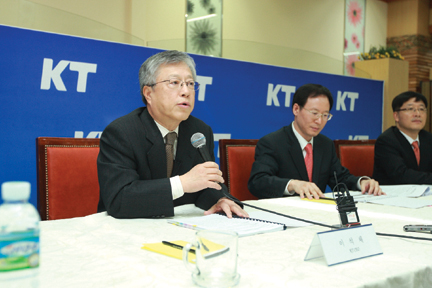KT Merges with KTF
CEO Lee suggests changes

KT has announced a plan to merge with its mobile subsidiary KTF, sending a shockwave across the Korean telecommunications industry.
The Korea Communications Commission (KCC) will review the validity of KT's merger with KTF amid rivals' opposition to the action.
KT announced on Jan. 20 that its board of directors approved KT's consolidation with KTF and it would submit an application for the merger with the KCC in order to take the lead in an era of full-fledged convergence and step up its global competitive edge.
Explaining the background of the consolidation, the nation's largest fixed-line company said the merger was designed to make the combination of KT and KTF a global communications provider, taking the lead in the convergence industry by combining fixed-line and wireless communications and helping the Korean IT industry make another leap.
In keeping with global convergence trends, a single company in 11 countries, including Italy and Switzerland, provides fixed-line and wireless services simultaneously, while fixed-line companies in 11 countries, including the United States, own 100 percent of their wireless subsidiary. In particular, China has reorganized the convergence environment in order to secure a global competitive edge by reducing the number of fixed-line and mobile service providers from six to three.
On the other hand, as the domestic telecommunications market has hit a wall in the structure separating the fixed-line and wireless service markets, the fixed line service sector apparently shows signs of saturation, while mobile service providers are engaged in exhausting, cutthroat marketing competition. This phenomenon has caused woes to both the fixed line service industry, which suffers a dearth of investment sources, and the mobile service industry, which is faced with a lack of investment incentives.
In order to overcome the woes facing the two industries, KT set four goals for the newly inaugurated consolidation company: taking the lead in the convergence industry; evolving into a global telecommunications service provider; making the fixed-line business efficient; and inducing another jump in the IT industry.
KT said the direct effects of the merger over the next five years will bring about 5 trillion won worth of production induction effects; the creation of about 30,000 jobs; ensuring fair competition; creating a new market; and inducing the simultaneous growth of related companies.
KT President and CEO Lee Suk-chae said, "The merger is not a problem for a single company, but one designed to prevent the Korean IT industry from suffering from arteriosclerosis." He stressed the need for the merger, saying that it is the winners' survival method to respond in a nimble and proactive manner, and KT would regain its leadership and induce another jump in the IT industry through the consolidation.
A consolidated corporate entity will be inaugurated via an extraordinary shareholders' meeting after gaining the go-ahead from the KCC.
Meanwhile, KT decided to issue $250 million worth of exchange bonds with a five-year maturity for NTT DOCOMO in which KTF owns a 10.7 percent stake as the second largest shareholder.
In a related development, newly inaugurated KT CEO Lee indicated a tremendous change in the company. "Naver's employees don't even consider KT as its rival since they all act and work like they own their company, whereas we consider ourselves salary men. Salary men can't compete with owners," he said.
The company also announced its reshuffling and the consolidation of its web of operational units into two customer groups and three business divisions, all reporting to the "Corporate center," where Lee will be in command.
KT also took a step to reduce its 267 telephone stations nationwide to 50 by the end of February as it trims its regional units. Lee refused a lavish ceremony and delivered an hour-long speech on the company's Internet protocol television (IPTV) network.
KT's fixed-line telephony services have been the company's mainstay business year for years, but KT is suffering a setback as it continues to lose customers to mobile telephony and voice over Internet protocol (VoIP) services offered by rival carriers.
The company strives to take the lead in new markets, such as IPTV. nw
KT President and CEO Lee Suk-chae holds a news conference after taking the helm at the nation's fixed-line telecommunication provider.
3Fl, 292-47, Shindang 6-dong, Chung-gu, Seoul, Korea 100-456
Tel : 82-2-2235-6114 / Fax : 82-2-2235-0799